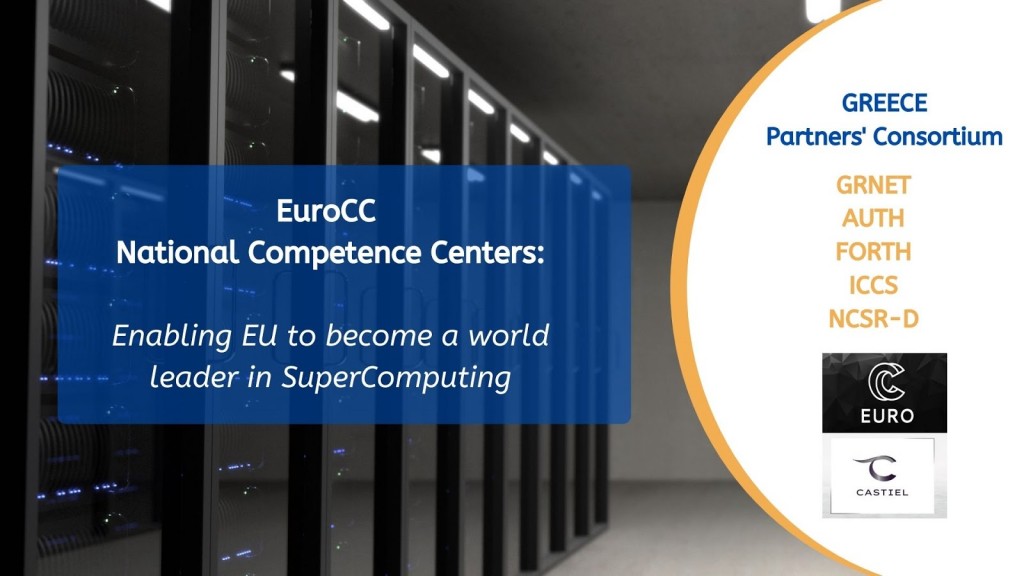 In a joint project that started on the 1st of September 2020, EuroCC and CASTIEL started to build a European network of 33 National HPC Competence Centres. Half of the budget funding comes from Horizon 2020, the Research and Innovation funding programme of the EU, while the other half will come from the 33 participating countries. In the next two years, the two projects will bridge the existing HPC skills gaps while promoting cooperation and the implementation of best practices across Europe.
In a joint project that started on the 1st of September 2020, EuroCC and CASTIEL started to build a European network of 33 National HPC Competence Centres. Half of the budget funding comes from Horizon 2020, the Research and Innovation funding programme of the EU, while the other half will come from the 33 participating countries. In the next two years, the two projects will bridge the existing HPC skills gaps while promoting cooperation and the implementation of best practices across Europe.
Α National Competence Center (NCC) is a framework set up at national level, to address the needs for a single reference point for access to knowledge, and getting support for the use of High Performance Computing (HPC) and associated technologies (e.g. High Performance Data Analytics, Artificial Intelligence).
Each one of the 33 National Competence Centres, will be part of the EuroCC network, will act locally to map available HPC competencies and identify existing knowledge gaps. The competence centres will coordinate HPC expertise at national level and ease access to European HPC opportunities for research and scientific users, public administration but also in different industrial sectors, delivering tailored solutions for a wide variety of users. The potential NCC users are from academia, research, industry, government bodies as well as interested citizens.
CASTIEL will promote interaction and exchange of expertise across the entire EuroCC network. The project will develop a Europe-wide competency map presenting both available resources and knowledge gaps across all EuroCC competence centres. This will encourage potential collaborations, exchange of best practices, sharing of knowledge and expertise between different nations to efficiently address skill gaps and close them. CASTIEL will coordinate activities like international workshops, mentoring and twinning partnerships, and topic-specific working groups to address issues of shared interest.
The final aim of the projects is to ensure a coordinated and consistent high level of expertise across Europe in HPC and related disciplines such as high-performance data analytics (HPDA) and artificial intelligence.
For Greece, GRNET is coordinating the efforts of a consortium of partners (AUTH, NCSR–D, FORTH, ICCS) with the overall objective to create an HPC Competence Centre in Greece, in order to enable the efficient uptake of HPC technologies with the three-fold goal to:
- advance competitiveness in research,
- improve effectiveness of government services and
- promote innovation in industry.
To reach these goals, the HPC Competence Centre in Greece, will aim to:
- put in place appropriate management structures in relation to providing effective services to government and industry,
- build a high-level support team that will provide training programs and user support, code development, co-design and integration of local users and SMEs into the European landscape,
- pursue common collaborative projects with other HPC Centres, and
- ensure awareness creation.
This project has received funding from the European High-Performance computing Joint Undertaking (JU) under grant agreement No 951732. The JU receives support from the European Union’s Horizon 2020 research and innovation programme and Germany, Bulgaria, Austria, Croatia, Cyprus, Czech Republic, Denmark, Estonia, Finland, Greece, Hungary, Ireland, Italy, Lithuania, Latvia, Poland, Portugal, Romania, Slovenia, Spain, Sweden, United Kingdom, France, Netherlands, Belgium, Luxembourg, Slovakia, Norway, Switzerland, Turkey, Republic of North Macedonia, Iceland, Montenegro
FUNDING: 1.800.000: H2020 (EuroHPC Joint Undertaking [JU]) and through national funding program from GSRI (General Secretariat for Research and Innovation in Greece).

